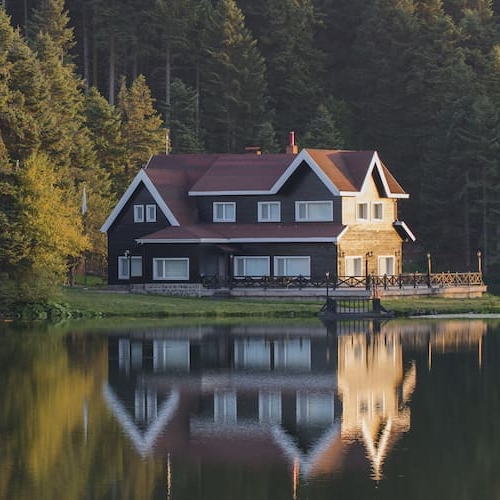What is vacant home insurance and why do you need it?
Contributed by Karen Idelson, Tom McLean
May 20, 2025
•6-minute read

If you own a home that’s going to sit empty for any significant length of time, you might wonder whether your regular homeowners insurance policy will cover it. Unfortunately, the answer is probably not. That’s because regular homeowners insurance policies often include a vacancy clause that limits or excludes coverage if your home is left vacant for more than a month or two.
So, for everything from inclement weather, fire and plumbing leaks to vandalism, theft and personal liability, you likely need a vacant home insurance policy. It can save stress, time and a lot of money if anything happens, so it’s worth looking into what this policy covers, what it costs, and how to find the right policy for your situation.
Defining vacant home insurance
Vacant home insurance is a special kind of insurance designed to protect homes that sit empty for long periods of time, typically more than 30 – 60 days, depending on the policy.
There is also usually a very specific definition when it comes to a “vacant home.” For instance, most insurers distinguish between a vacant home and an unoccupied one, in addition to the time it is empty.
A vacant home typically lacks furniture and is sitting empty. An unoccupied home, on the other hand, has furniture, utilities, but no occupants – at least for a while. But the idea is that the unoccupied home is in a state in which the owner could return and live there at any time. For instance, a home used seasonally would be an example of an unoccupied home. A rental property between renters for months, an empty home for sale, or a home under construction are examples of a vacant home.
This is an important distinction since if you have a vacation home that is furnished, with utilities, but that you leave unoccupied for months out of the year, you might still need a special policy. But that policy will likely be different than a vacant home policy. You’ll need to check with your insurer.
What does vacant home insurance cover?
Policies vary depending on the insurance company and type of home, but in general terms, here’s what a vacant home insurance policy covers:
- Fire and smoke damage. This typically includes damage from electrical fires, wildfires, and accidental fires.
- Vandalism and theft. This usually includes protection against break-ins, stolen property, and vandalism, including such things as riots.
- Weather-related damage. This covers things like windstorms, hail, or lightning strikes.
- Liability coverage. This includes someone getting injured on your vacant property, including coverage against their medical bills.
- Water intrusion. This includes things like leaky pipes or sprinkler issues.
Again, not all insurers’ vacant home insurance policies cover all of the above, so it’s important to ask your agent detailed questions and read your policy carefully.
Should I have homeowners insurance for vacant homes?
In short, yes. In fact, if you have a mortgage on the property your lender might well require you to have it. If you own the property outright, it’s still a good idea. If anything happens, you could sustain major repair bills or legal costs.
These are very real dangers since most agree that the risk to vacant homes is often more significant than occupied ones. For instance, vacant homes are more vulnerable to squatters and vandalism. They also can be more likely to have serious fire and other damage since problems are not caught early.
So vacant home insurance can really pay off in the long run. If your home becomes vacant, then your homeowners insurance policy company can help you transition to a vacant home policy, or possibly give you an endorsement, or add-on, to your homeowners insurance policy.
Where can I get insurance for my vacant home?
Vacant home insurance is usually easy to find. Big-name insurers like USAA, Farmers, and Progressive all offer policies. In addition, there are many other companies who do as well. The important thing is to shop around.
Generally, it’s a good idea to:
- Start with your current homeowners insurance provider. They may offer an add-on or endorsement to your current homeowners policy.
- Compare quotes. Different providers offer different rates and coverage.
- Compare policy duration minimums. Some companies write policies in 3- or 6-month increments, some only offer 12-month policies. So, there’s no need to pay for more than you need.
- Check local providers: If you live in an area with unique risks, like hurricanes or wildfires, local insurers might have a policy that fits your needs better.
How much is vacant home insurance?
There’s no getting around it, vacant home insurance will likely cost you more than standard homeowners insurance. It could range between 25% and 50% higher. With the national average cost of homeowners insurance costing $2,728 annually, depending on the source and the state, a vacant home insurance policy could cost $3,410 or more a year.
Of course, many factors can decrease or raise that cost. This is because of the added risks that come with a vacant property, as mentioned above. More risk equals higher premiums. More risk also equals more reason to have insurance. So take this consideration seriously.
Things that may influence the cost of vacant home insurance
If the above figures scare you, remember, there are many factors that can affect how much you’ll pay for vacant home insurance, some of which you can control. Here are some common things that can influence your policy’s price:
- Location. Higher-risk areas, such as places in wildfire zones or high-crime neighborhoods, will increase premiums.
- Condition. Homes that are well-maintained with plumbing and electrical in good condition will cost less to insure.
- Security measures. Properties with cameras, motion-sensor lights and other security measures could lower premiums.
- Vacancy duration. The less time a property is expected to be vacant, the less the policy should cost.
How do I buy vacant home insurance?
The process of buying vacant home insurance is pretty straightforward, and similar to buying homeowners insurance. Here are the steps you should follow:
- Determine if you need vacant home insurance. If your home has no furnishings and will be empty for more than 30 days, there’s a decent chance you’ll need vacant home insurance.
- Check your current coverage. If you have a homeowners insurance policy for the property, your current insurer might offer an endorsement or add-on that will cover your property once it’s vacant. If not, they might offer a smooth transition to a new policy.
- Research insurers. Make sure you trust the company you insure your home with, especially if they are not one of the major brands in the business. Saving a little money now could cost you a lot of headache or money later.
- Get several quotes. This is a major decision on a major investment, so it pays to get more than one, or even two, quotes. It also provides peace of mind when you do make a final decision.
- Make sure the policy fits your needs. It’s pointless saving money on a policy that doesn’t cover something essential, and it’s just as wasteful to spend more for coverage you don’t need.
When you’ve found the perfect policy, sign on the dotted line and enjoy the comfort of knowing your property is protected.
FAQs on vacant home insurance
Here are answers to common questions about vacant home insurance.
Are there differences between vacant property insurance and homeowners insurance?
Yes, and they are important in case you need to file a claim. Essentially, homeowners insurance assumes someone is living in the home, so it often has a vacancy clause. This clause means your coverage is limited or excluded for your home if it becomes vacant for more than 30 – 60 days.
Are vacant property insurance and unoccupied home insurance the same?
No. A vacant home is unoccupied, but it typically has no furniture or personal belongings. An unoccupied home is one with furniture and utilities, but it isn’t being used for long periods of time – a vacation home, for instance.
Is vacant homeowners insurance worth it?
Probably. Like all insurance, you’re buying protection against what might happen. But considering the higher risks of vandalism, squatters, unattended burst pipes, and more, vacant property insurance could save thousands if tragedy strikes.
The bottom line: Vacant home insurance offers peace of mind
Hoping for the best with an asset as valuable and complex as a house really shouldn’t be your go-to option. And it’s very likely that your homeowners insurance policy doesn’t cover vacancies of months on end. Couple that with the fact that the risks to empty homes are heightened, and a vacant home insurance policy is well worth considering. If nothing else, it will offer peace of mind. And that’s priceless.

Terence Loose
Related resources

7-minute read
What is homeowners insurance and how does it work?
Mortgage lenders require homeowners insurance, which reimburses you if your home is damaged or destroyed. Learn how to choose the right policy for your home.
Read more

3-minute read
Is homeowners insurance required? What buyers should know
While homeowners insurance isn’t legally required, mortgage lenders will usually require it. Learn more about homeowners insurance requirements for buy...
Read more
5-minute read
What Is renters insurance? Defined and explained
Renters insurance is a way for renters to protect themselves and their belongings when renting property. Learn about what’s covered with renters insura...
Read more